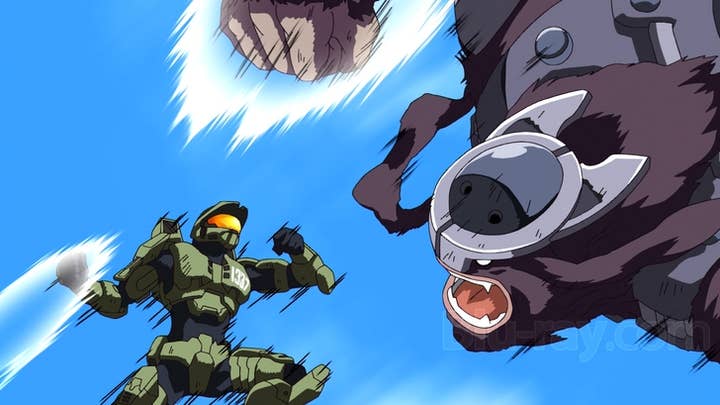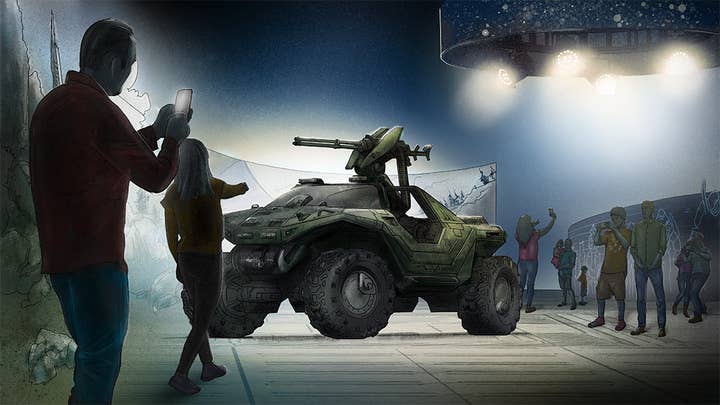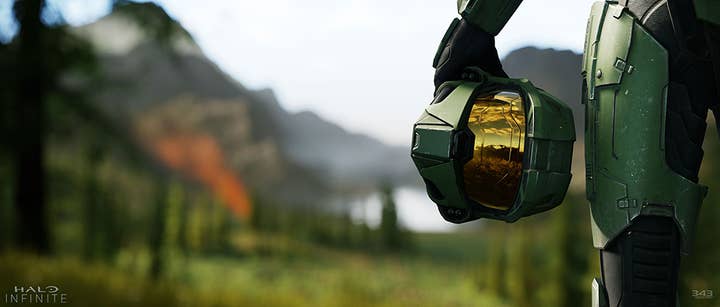To Infinite and beyond: Attracting new Halo fans without a new game
343 Industries' Kiki Wolfkill explains how the studio's transmedia efforts will prepare the world for Master Chief's return
It has been four years since the last major Halo game, and a full 18 since the series debuted on the original Xbox. After such a long time, many franchises struggle to retain their relevance, especially in the wake of new rival IP like Destiny stealing the spotlight.
Yet as Xbox gears up to (hopefully) offer more detail on the much anticipated Halo Infinite at E3 next week, 343 Industries' Kiki Wolfkill observes that the sci-fi series has been far from absent from the past few years -- and not just because of Halo Wars 2 or the arcade game Fireteam Raven.
The studio's head of transmedia and entertainment spoke with GamesIndustry.biz at Reboot Develop earlier this year and talked us through how books, comics, podcasts and more have not only kept fans entertained, but have also prepared a new audience for Infinite.

"That's a huge challenge for any IP, even wider entertainment franchises," she said. "Part of why there's been that span of time between Halo 5 and Infinite is the retooling of the infrastructure to give us the flexibility to do whatever we wanted with that game. But it's also about setting off the next generation of Halo. We want people to be able to come into Halo Infinite who may not have played any other Halo game before.
"At the same time, part of what my role is and my goal with the transmedia pieces is, how do we start to engage new audiences and bring people into the universe so that when Infinite comes out, maybe people who haven't played before are interested in playing."
Since Halo 5 came out in 2015, there have been regular comic books and close to ten novels, but the biggest push was around the game's launch itself. In addition to novels and comics, there was the Hunt The Truth audio drama podcast, and a Halo: Nightfall live-action web series -- all of which teased events that would happen in the game. It was a major effort on Xbox's part, and one Wolfkill recognises had its hits and misses.
"There were certainly successes there -- for instance, the Hunt the Truth podcast. That was the first time we'd done audio storytelling outside the audio version of our novels. From a story perspective and a pure creative perspective, it was amazing. It did a great job of building the momentum in anticipation for the story going into Halo 5."
"It's about setting off the next generation of Halo. We want people to be able to come into Halo Infinite who may not have played any other Halo game before."
However, on reflection, Wolfkill admits that some of the transmedia projects were "too deliberate" in how they tied into Halo 5's story. Nightfall, for example, was designed to build the backstory for Locke before he became the new playable character, while some of the novels expanded on the character of Buck. But for all the good intent behind them, these didn't prove to be the gateway into Halo 5 that Xbox hoped for.
"Hunt the Truth felt successful because it was a suspenseful story on its own and led into Halo 5," Wolfkill said. "But some of the other pieces were so carefully constructed to attach to the story of the game that, even though we said they were enjoyable standalone pieces, it really felt like you had to ingest it all at the same time. It didn't feel very approachable for people new to the franchise, which was already a struggle with a game called Halo 5.
"Authenticity is such a priority for any of those efforts, and it is always a challenge because the reality is sometimes you do those things for marketing value, to build excitement [for the game]. But it still has to feel as authentic as anything else and has to feel true to the fans and the universe as any other piece. Winding these pieces so tightly together made it harder for some people to unpack, and it made the story more complex when we had so many pieces at the same time."
Transmedia is certainly not a new focus for the Halo franchise. The original Combat Evolved was accompanied by a prequel novel, The Fall of Reach, and in 2010 Xbox released Halo Legends, an animé anthology that Wolfkill holds as one of the biggest successes when it comes to creating entertainment outside the games.

"Legends really helped us learn how to work with other creative partners," she said. "It felt risky for us because we were going to work with a bunch of different partners, we were going to let them interpret these stories in different ways with different visual styles. That felt scary at the time, but the result was really powerful and felt really interesting.
"Even though Halo Legends isn't the most famous piece of Halo content out there, it does feel authentic, different, and really helped us build some muscle around how we bring other creators into our universe and let them play. Philosophically, we've carried that forward and really like the idea of different creative voices in our universe -- even if that creative expression feels very different from anything we've done before."
"We need to find the right avenues... that are appropriate for kids and give parents permission to feel like they can allow their kids to indulge in Halo"
Crucially, these efforts are not just about keeping established Halo fans engaged between games. Wolfkill talked about reaching the people around them, friends and loved ones who may have watched players explore Halo from the other side of the couch. It's also about reaching lapsed players, the ones who poured hours into the early Halo games but may not have the time to do so now. Groups like this are what the touring fan experience Halo Outpost Discovery has been designed for.
It's hoped the event will also appeal to families, although this presents the precarious situation of marketing to children. The Halo games, the core of the franchise, are teen rated (16 in the UK and Europe), and yet Legends was rated 13, Nightfall was 12, and there is no age limit for comics or books. Moreover, there are Halo toys available to kids as young as eight.
Wolfkill explained that, while the games themselves are not designed for children, a lot of the core theme -- heroism, humanity and hope -- are "very appropriate for a younger audience," which is why Xbox is comfortable creating Halo products like this. And again, it's cultivating future fans of the games.
"We think a lot about how we expand to a younger audience knowing that we have parents who play Halo, love Halo and do want to share it with their kids," Wolfkill said. "We need to find the right avenues knowing that, at our core, those are the themes we think about that are appropriate for kids and give parents permission to feel like they can allow their kids to indulge in Halo. That's also part of Halo Outpost Discovery -- it was deliberately built to engage both very young kids and adult players. There's a whole range of experiences there."
Perhaps the biggest challenge for expanding the Halo universe is its iconic protagonist, Master Chief. Over the years, the Chief has toed the line between fully developed character and blank avatar for players to impose their own personality on. That makes it difficult to tell stories about a man who is both someone and no one, and even more difficult to tell stories without such a familiar face (or helmet) fronting them.

Wolfkill admits she was "certainly naïve about the challenge of what it would mean to adapt a character like Master Chief" when she began, but efforts on the much anticipated Halo TV series has helped her understand that balance.
"With Star Wars, Star Trek, Lord of the Rings, or these IPs where it doesn't matter what comes out, I engage in it because I always want to be part of that universe. That's where I want us to get to with Halo"
"As much as we really strive to give Chief a journey and an emotional arc in the games, it's also something that's been designed so people can either take it or leave it, depending on how much they want to invest in the story and the games," she explained. "That's an important aspect of the TV show -- his journey, who he is and what it means for him to grow and evolve -- and that's just really complex to express. It means that you see him in circumstances you don't see in the game, and that feels a little jarring as a player.
"The hope is that the journey of the show and the story is at a quality and execution that people can set aside the parts they feel they own of him, still feel respected for feeling that ownership, but we have to be able to tell a story. It's tough. I think it will be exciting, invigorating to see him come to life, and I think everyone will have the moment of, 'Oh, I thought of him like this,' but hopefully we can move him into the story."
It doesn't help that Master Chief's origin story has already been told in the original Fall of Reach novel. When Xbox eventually adapted this into the game Halo: Reach, albeit without Master Chief, there were some discrepancies between book and game. For Wolfkill's transmedia efforts, this raises the ever-divisive issue of what is and isn't canon. How much is she and her team beholden too, and does that limit the stories she wants to tell?
"That's exactly the kind of thing we want to avoid -- if there are places where we end up moving adjacent to canon, because we need to for the sake of telling the best story for that medium, we'll be very open about it. To make changes and not explain it or even acknowledge it doesn't feel respectful.
"Game of Thrones is a great example -- I read all those books and when they strayed from the books' story I immediately noticed it, but I totally understood why they did that because it created a great moment or added depth to a character."
For Wolfkill, transmedia is, "just an expression of your universe and the connection that people have to it." All 343's efforts in this regard are designed to show the strength and depth of the Halo fiction, especially in the build up to a crucial new release like Infinite. The obvious but valid comparison is Star Wars, which is able to tell stories in different ways because there is, "such fan love and respect for that universe and those characters." And even though Star Wars has made its own missteps, it's something Wolfkill would love for Halo to emulate.
"What I ultimately want is that we have this universe that people love, feel loyal to and have nostalgia for," she said. "I think about it in the same way I feel about Star Wars, Star Trek, Lord of the Rings, or these IPs where it doesn't matter what comes out, I want to engage in it because I always want to be part of that universe. That's where I want us to get to with Halo."

